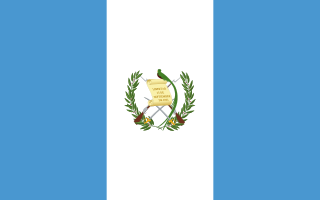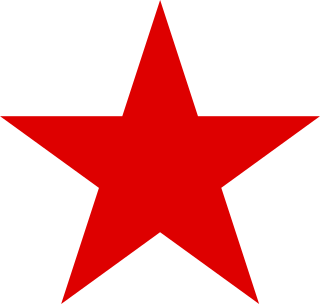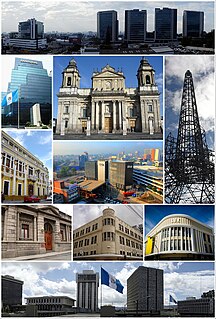
Pedro de Alvarado y Contreras was a Spanish conquistador and governor of Guatemala. He participated in the conquest of Cuba, in Juan de Grijalva's exploration of the coasts of the Yucatán Peninsula and the Gulf of Mexico, and in the conquest of Mexico led by Hernán Cortés. He is considered the conquistador of much of Central America, including Guatemala, Honduras and El Salvador. Although renowned for his skill as a soldier, Alvarado is known also for the cruelty of his treatment of native populations, and mass murders committed in the subjugation of the native peoples of Mexico.

Tecun Uman was one of the last rulers of the K'iche' Maya people, in the Highlands of what is now Guatemala. According to the Kaqchikel annals, he was slain by Spanish conquistador Pedro de Alvarado while waging battle against the Spanish and their allies on the approach to Quetzaltenango on 12 February 1524. Tecun Uman was declared Guatemala's official national hero on March 22, 1960 and is commemorated on February 20, the popular anniversary of his death. Tecun Uman has inspired a wide variety of activities ranging from the production of statues and poetry to the retelling of the legend in the form of folkloric dances to prayers. Despite this, Tecun Uman's existence is not well documented, and it has proven to be difficult to separate the man from the legend.

José Joaquín Rodríguez Zeledón was President of Costa Rica from 1890 to 1894.

Carlos Castillo Armas was a Guatemalan military officer and politician. After taking power in a coup d'état, he served as the President of Guatemala from 1954 to 1957. A member of the right-wing National Liberation Movement (MLN) party, his authoritarian government was closely allied to the United States.
Elfego Hernán Monzón Aguirre was a Guatemalan army officer who was President of Guatemala and leader of a military junta from 29 June 1954 to 8 July 1954, during the 1954 Guatemalan coup d'état.

The Spanish conquest of Guatemala was a protracted conflict during the Spanish colonization of the Americas, in which Spanish colonisers gradually incorporated the territory that became the modern country of Guatemala into the colonial Viceroyalty of New Spain. Before the conquest, this territory contained a number of competing Mesoamerican kingdoms, the majority of which were Maya. Many conquistadors viewed the Maya as "infidels" who needed to be forcefully converted and pacified, disregarding the achievements of their civilization. The first contact between the Maya and European explorers came in the early 16th century when a Spanish ship sailing from Panama to Santo Domingo was wrecked on the east coast of the Yucatán Peninsula in 1511. Several Spanish expeditions followed in 1517 and 1519, making landfall on various parts of the Yucatán coast. The Spanish conquest of the Maya was a prolonged affair; the Maya kingdoms resisted integration into the Spanish Empire with such tenacity that their defeat took almost two centuries.

Monzón is a small city and municipality in the autonomous community of Aragon, Spain. Its population was 17,176 as of 2014. It is in the northeast and adjoins the rivers Cinca and Sosa.
Raúl Alfredo Magaña Monzón was a Salvadoran footballer and manager.
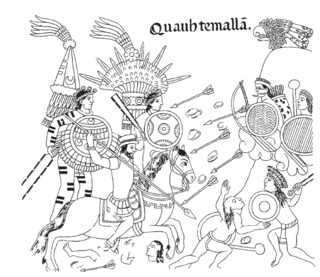
Indian auxiliaries or indios auxiliares is the term used in old Spanish chronicles and historical texts for the indigenous peoples who were integrated into the armies of the Spanish conquistadors with the purpose of supporting their advance and combat operations during the Conquest of America. They acted as guides, translators, or porters and in this role were also called yanakuna, particularly within the old Inca Empire and Chile. The term was also used for formations composed of indigenous warriors or Indios amigos, which they used for reconnaissance, combat, and as reserve in battle. The auxiliary Indians remained in use after the conquest, during some revolts, in border zones and permanent military areas, as in Chile in the Arauco War.

The Spanish conquest of the Maya was a protracted conflict during the Spanish colonisation of the Americas, in which the Spanish conquistadores and their allies gradually incorporated the territory of the Late Postclassic Maya states and polities into the colonial Viceroyalty of New Spain. The Maya occupied a territory that is now incorporated into the modern countries of Mexico, Guatemala, Belize, Honduras and El Salvador; the conquest began in the early 16th century and is generally considered to have ended in 1697.
Beatriz de la Cueva de Alvarado, nicknamed "La Sinventura" - "the unfortunate" - was a Spanish noblewoman from Úbeda in Andalucia who became the governor of the Spanish colony of Guatemala for a few days in September 1541. She was killed by an earthquake shortly after taking office. Unique as the only woman to hold such a position in a major division of Spanish Latin America in colonial times, she is credited with having introduced the Spanish style of house construction and Spanish customs into Guatemala. She was buried in the cathedral of Santiago de los Caballeros de Guatemala.
Huberto Alvarado Arellano (1927–1974), was a Guatemalan poet, essayist and communist political figure. He was born in 1927 and died in 1974 at the hands of paramilitary death squads. His interest in politics stemmed from his experiences in the Guatemalan Revolution of 1944-1945, which were marked by his immersion in leftist politics. He was soon named Secretary General of the Guatemalan Alliance of Democratic Youth.
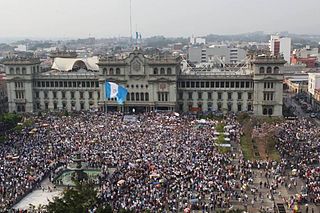
La Línea corruption case began in Guatemala on April 16, 2015, when the International Commission against Impunity in Guatemala and State prosecutors accused a number of politicians in the administration of President Otto Pérez Molina of setting up a customs corruption ring with the help of high-ranking officials in the tax and customs administration. Several demonstrations ensued, calling for the resignation of Pérez Molina and his vice-president Roxana Baldetti. Among the accused were the retired captain Juan Carlos Monzón, and the directors of the Tax Administration Superintendency or Superintendencia de Administración Tributaria, (SAT), an entity analogous to the US Internal Revenue Service. Baldetti resigned in early May, to the joy of thousands of demonstrators.
The Spanish conquest of Honduras was a 16th-century conflict during the Spanish colonization of the Americas in which the territory that now comprises the Republic of Honduras, one of the five states of Central America, was incorporated into the Spanish Empire. In 1502, the territory was claimed for the king of Spain by Christopher Columbus on his fourth and final trip to the New World. The territory that now comprises Honduras was inhabited by a mix of indigenous peoples straddling a transitional cultural zone between Mesoamerica to the northwest, and the Intermediate Area to the southeast. Indigenous groups included Maya, Lenca, Pech, Miskito, Sumu, Jicaque, Pipil and Chorotega. Two indigenous leaders are particularly notable for their resistance against the Spanish; the Maya leader Sicumba, and the Lenca ruler referred to as Lempira.

General elections were held in Costa Rica in 2018 to elect both the President and Legislative Assembly. The first round of the presidential election was held on February 4, 2018, with the two highest-ranked candidates being Christian singer and Congressman Fabricio Alvarado Muñoz from the conservative National Restoration Party and writer and former Minister Carlos Alvarado Quesada from the progressive Citizens’ Action Party, gaining 24% and 21% of the votes respectively. As no candidate received more than 40% of the first round vote, a second round run-off election was held on April 1, 2018 and was won by Carlos Alvarado Quesada, with a landslide victory of 60.6% of the vote.
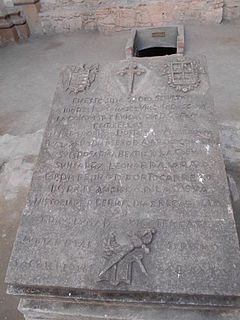
Pedro de Portocarrero was a Spanish conquistador who was active in the early 16th century in Guatemala, and Chiapas in southern Mexico. He was one of the few Spanish noblemen that took part in the early stages of the Spanish conquest of the Americas, and was distantly related to prominent conquistador Pedro de Alvarado, who appointed him as an official in early colonial Guatemala.
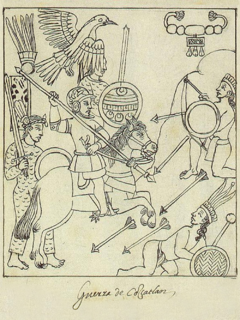
The Spanish conquest of El Salvador was the campaign undertaken by the Spanish conquistadores against the Late Postclassic Mesoamerican polities in the territory that is now incorporated into the modern Central American nation of El Salvador. El Salvador is the smallest country in Central America, and is dominated by two mountain ranges running east-west. Its climate is tropical, and the year is divided into wet and dry seasons. Before the conquest the country formed a part of the Mesoamerican cultural region, and was inhabited by a number of indigenous peoples, including the Pipil, the Lenca, the Xinca, and Maya. Native weaponry consisted of spears, bows and arrows, and wooden swords with inset stone blades; they wore padded cotton armour.
